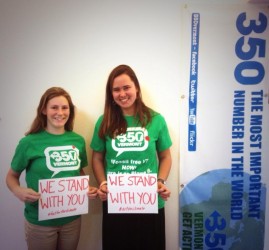5 Things I Learned Working As a Full Time Activist at 19
Aly Johnson-Kurts
|June 20, 2014

Aly Johnson-Kurts has been organizing for climate solutions since her High School days and is now the State Pension Divestment Organizer for 350VT at the age of 19. In February, Aly and 350VT teamed up with ACE to host a Youth State Divestment Rally & Press Conference at the Vermont Statehouse. The event was a huge success! Check out the compelling testimony of students before legislators starting at minute 14 of this video: http://vimeo.com/
Want to become a powerful Youth Organizer like Aly? Check out her advice to get started!
My name is Aly Johnson-Kurts, and last summer, at the ripe age of 19, I decided to take a year off from college to fight the climate crisis. As a Vermonter I have always been concerned with environmental issues. My family has been maple sugaring since I was a baby, and I want to be able to share this special pastime with my children. I understand that climate change has the potential to completely disrupt maple sugaring, and nearly everything I hold dear. In fact, each of us has something irreplaceable to lose from a future defined by climate chaos. Climate change must become a priority issue for my generation if we hope to enjoy a liveable world, so I want to share 5 of the most important things I learned on my gap year to inspire you to step up to this challenge.
1) The importance of training
After helping lead the Smith College fossil fuel divestment campaign my freshman year I knew I needed training to be more effective. I decided to apply for the 350.org summer Fossil Free Fellowship and was selected to participate in a week of grassroots organizing training with 36 other young people, followed by an Divestment Intern position with 350Vermont.
If you hope to make a difference, getting training is the place to start. The 350.org Fossil Free Fellowship, the Greenpeace Semester, and SPROG, the Sierra Club’s youth summer grassroots training program (currently accepting applications!) are all great programs. They will give you the opportunity to develop the tools to be effective, steep you in critical anti-oppression principles and practice (the idea that there is strength in recognizing the interconnectedness of struggles against racism, sexism, classism etc., and working to equalize these power imbalances), and will help you build a network of allies who will help you bring your crazy ideas to fruition.
2) Think big!
As my summer internship ended I found out that 350Vermont was hiring a State Divestment Organizer. My internship had been largely focused on divestment, so I decided to put school on hold to apply to continue to support the campaign. Luckily I got the job, because (I’ll admit) I had no back up plan. In September I began working part time, and by January was working slightly less than full time: 9-5 nearly every day. It was new, it was challenging, and it was unbelievably rewarding.
At around the same time I began planning a Keystone XL Pipeline protest with a few friends, mostly former Fossil Free Fellows. We knew we wanted to do something big, so we set out to organize the largest youth civil disobedience in a generation as a way to draw attention to how serious the impacts of our decisions around fossil fuel infrastructure will be on our future. We called it XL Dissent- as a play on word. Many nights I would finish work and hop right on a conference call to make decisions about the protest’s messaging, plan for busses to bring young people from around the country to Washington DC, and coordinate funding and support for the event. In your own organizing think big- rely on your support network to help make your plans reality. Ask early and often for help, and you’ll build strong and reliable relationships.
3) Make time to set important groundwork, it will save you time later
I can’t tell you how many times I’ve ended a conference call feeling like altogether too many ideas were brought up and no decisions were made. Let me offer a solution: it’s called Modified Consensus. To begin, one person offers an idea as a proposal. Then, everyone in the group has the opportunity to add amendments or suggest changes. A vote is taken, and with majority support the proposal passes. At that point, there is an opportunity for anyone to veto the proposal, but ONLY if they have serious moral concerns. Agreeing to this or a similar process will make you incredibly more efficient along the way. Look for places where you can institute similar groundwork to save yourself time, such as making a plan for exactly when and how you will communicate with your group.
4) Make space to talk about the hard stuff
350Vermont has a staff meeting every other week, and one of my favorite features was a designated time to air “tough stuff”. Each employee was given the opportunity to share things that had been hard or ticked them off. This meant that no one spent long brewing- all of our concerns were aired because we didn’t need to waste time mustering the courage to say something. Try to incorporate this practce into your future endeavors- it will spare you from pent up frustration, which is deadly.
5) Publicize! Publicize! Publicize!
Part of the reason I considered many of the events I organized successes were because they garnered great publicity. In January, a press conference for college students from 3 different campus divestment campaigns to lend their support to the state divestment bill went out on the AP wire, and was published in newspapers across the country. A state divestment rally made the front page of the regional paper when a photographer snapped a photo of supporters singing to a legislator. That rally was also covered by all of the most crucial blogs our state politicians frequent. XL Dissent was a whole new ballgame- check out the coverage from CNN, The Huffington Post, and, my favorite article, published in The Nation. Nearly every major news outlet covered the event.
Mainstream publicity requires writing a press release, researching reporters’ and photographers’ contact information, making phone calls, sending emails, and calling and emailing again. It’s worth putting effort in to reach your target audience though- your impact will be incredibly multiplied. You can also be your own publicity: write an article about what you’re doing, share it on social media, including organizational Facebook pages and pages for people with similar interests, start a hashtag for an event, tweet at campaign leaders. Every bit helps forward your cause to new audiences.
Now I’m calling you to action
We need a new generation of leaders on climate. The older generation currently holding the majority of the political and monetary power in the United States has shown time and time again that they are not willing to resist the strong fossil fuel lobby and lead on this issue- they have too much to lose. As young people, we have too much at stake NOT to prioritize climate change: our coastlines, our cities, our infrastructure, our pastimes. Get out, connect with a campaign, receive training, and join me.
Join our Youth Action Network
More Blog Posts

Unnatural, Not Unprecedented
For two weeks, residents of Southern California endured a waking nightmare. Parents raced against time – hurrying down the driveway …
Read MoreCrafting a Vision for the Future: My Experience at LCOY USA 2024
Dry and sunny Tempe, Arizona where temperatures have been over 100 F for 113 consecutive days, delegates gathered to attend …
Read More
7 Ways to Weatherproof Your Home on the Cheap (+1 Not-So-Cheap)
As colder weather sets in, understanding how to weatherproof your home is key to maintaining warmth and reducing energy costs. …
Read More